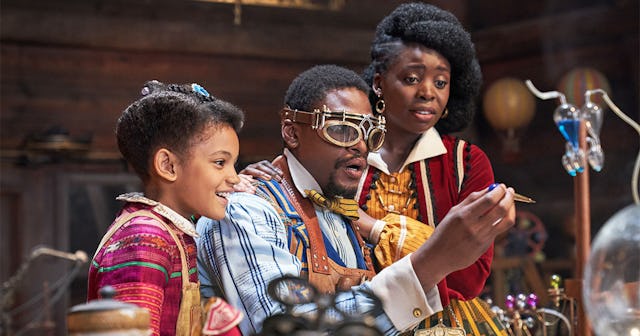'Jingle Jangle: A Christmas Journey' Gives Us Hope During This Holiday Season

When we saw that Jingle Jangle: A Christmas Journey was trending on Netflix, we immediately chose it to watch during our weekly Friday night family movie night. We were three minutes into the movie when the talking from my kids began as they worked to understand the storyline. My five-year-old made the connection early in the movie, comparing her brother’s skin color, the roundness of his nose and hair, to the young boy that reflected back at us from our television. She said to her brother, “That boy looks like you!” with a hint of surprise in her voice.
We were watching from the coziness of our own home a movie written and directed by a black man, David E. Talbert, with a cast made up of phenomenally talented actors — almost all people of color. It was a story that reminded us that anything is possible (even more diversity in Christmas movies!). It came just in time to give us the hope of seeing more people who look like us on the screen.
We all watched in amazement as the story of Jeronicus Jangle (Forest Whitaker), toymaker and inventor, was told in the opening scene by his granddaughter, Journey. In the retelling of his life’s story, the movie opens with grandmother Journey (Phylicia Rashad) narrating the events which caused Jeronicus Jangle to lose hope in his abilities. As we sang and danced around our living room to the songs, I found myself grateful to be experiencing yet another triumph this 2020 with my family: watching an all-black cast telling a story of a smart, hardworking, genius who renews his faith in his abilities because of his family — specifically, his young granddaughter. The Jangle family continues to believe in themselves, even after being knocked down.
Gareth Gatrell/NETFLIX
After his first invention — a talking, walking toy named Don Juan Diego (Ricky Martin) — comes to life, Jeronicus is excited about what this invention means for the financial future of his family. But Don Juan turns against him because he does not want to be mass-produced, and convinces Jeronicus’s apprentice Gustafson (Keegan-Michael Key) to steal Jeronicus’s book of inventions and take Don Juan with him as they run away, never to be seen again. Not long after, Jeronicus’s wife dies, leaving him a widower left to raise his young daughter, Jessica (Anika Noni Rose), which he fails at — and throws himself into his work as he grieves. With the losses he faces, he decides to put his dreams and inventions to bed, start fresh, and close his toy shop. He opens a pawn shop, which in turn loses money.
When his loans come due to the bank, he is given an ultimatum: Create a new invention, or pay the bank back by Christmas. With nothing to show and no prospect of coming up with some amazing invention, Jeronicus becomes a shell of a man. That is, until his granddaughter comes to spend the holiday with him. She would be what he needed to reignite the spark inside of him; she would also be the one to call out Gustafson when he returns to town to introduce a new toy he’d stolen (again) from Jeronicus. Gustafson became a rich man as Jeronicus lived a meager and sad life, until Journey appeared, giving him something to hope for and believe in again.
Gareth Gatrell/NETFLIX
My family and I got to spend two hours watching people who look like us dance, sing, and tell a story we needed to hear with the running theme spoken by Journey: “If you believe, it’s all possible” — a truth this parent needed to hear. We kicked off this holiday season dancing around our living room, just off the heels of dancing around for another reason: Joe Biden and Kamala Harris had won the election, another meaningful step in representation.
As we all hunker down, facing the possibility of another state-regulated quarantine, we can wallow in the hope that there will be more Christmas stories like Jingle Jangle, with actors of color on the screen, more people we can identify with. We will relish in the possibilities of what the future holds for Black and brown actors, who know not only that representation matters on the screen, but that it also matters in the writers’ room. In one scene, we hear Jeronicus tell us as much: “I got a say in how my story ends…make it work again.” As people of color, we know our stories best, and deserve the right to tell those stories.
Jingle Jangle has themes we can all relate to, like the power of forgiveness, being knocked down and getting back up again, and how love can change us. The power of storytelling from one generation to the next — from grandmother Journey in the opening scene to the very end — highlights something so important to Black people and our history, that storytelling will continue to give power to our family stories.
What Jingle Jangle: A Christmas Journey taught my family and me in the end is that love endures. Through struggle and heartache, through failed dreams and renewed ambition, through time and distance, love can rebuild us from the inside out if we believe. We will continue to work to tell our stories on and off-screen. Grandma Journey says, “Watch me fly higher than my obstacles … I am unstoppable.” We can be those unstoppable people, spreading joy with soul, hope, and love this Christmas season.
This article was originally published on